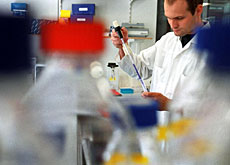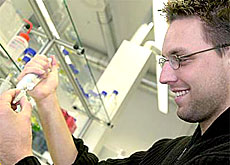Switzerland banks on biotech

Switzerland wants to boost its position as a leader in biotechnology with the inauguration of a new regional project.
Five French-speaking cantons have launched Bioalps to promote and coordinate the activities of 50 young biotech firms and around a dozen research institutions.
Switzerland currently has the highest density of biotech firms in Europe, with over 10,000 jobs in the sector. According to consultants Ernst & Young, turnover is around SFr3 billion ($2.2 billion) per year.
The joint project – launched in June and involving the cantons of Geneva, Vaud, Valais, Fribourg and Neuchâtel – is an attempt to bring economic diversity to a region which is overly dependent on the traditional sectors of banking and watchmaking.
“In addition to creating synergies, Bioalps will raise our visibility as we will be participating at international trade fairs and attracting foreign interest,” says Bernard Soguel, economics director in canton Neuchâtel.
Scientists expect biotechnology to produce spectacular results in fields such as medicine, nutrition, environmental protection and energy – raising fundamental questions such as the use of genetic engineering along the way.
Biotech is also expected to boost business growth and industrial output.
“Better than all other industries, biotech has weathered the storm that burst the new technology bubble,” says Philippe Sordet, economics director in canton Vaud.
Masters of miniature
Switzerland is well placed to exploit biotechnology, with its long tradition in microtechnology and nanotechnology, now practically a birthright of Swiss researchers.
“The Swiss are masters of the miniature, which is one reason for our success in electronics and pharmaceuticals,” Dubuis explains.
Almost all of the secrets of life which biotechnology hopes to unlock are contained in cells, enzymes and atoms — particles sometimes measuring less than one millionth of a millimetre.
So far, development in life science research has been heaviest in Basel, Zurich and the Lake Geneva region. One of the shining examples in the field is Serono, based in Geneva, which is Europe’s largest biotech company and number three worldwide.
But Benoît Dubuis, head of the faculty of life sciences at the Federal Institute of Technology in Lausanne, believes more could be done to boost research.
“To be world-class researchers, we have to create research and development clusters that combine public initiative, higher education and the private sector,” he says.
Biovalley
Basel is also exploiting the promise of biotechnology. In 1996, the canton established the Biovalley association, together with the French region of Alsace and Germany’s Baden-Württemberg.
The joint programme is designed to boost interregional projects.
Local authorities hope the association will create a counterweight to the two locally-based pharmaceutical giants, Roche and Novartis, which are both setting up biotech offshoots.
Mednet in Zurich
Meanwhile, Zurich has teamed up with other cantons in the central-eastern part of the country to bolster its biotech association, Mednet.
Established in 2000, Mednet aims to exploit the scientific and technological prowess of the Zurich University and of the Federal Institute of Technology.
Its most celebrated member is Prionics, whose test for the rapid diagnosis of BSE; or mad cow disease, attracted global interest.
Betting on the future
Other parts of Switzerland are also making names for themselves in biotechnology.
The canton of Bern has placed its bets on Berna Biotech, one of the top vaccine makers in the world, and the canton of Ticino boasts no less than three major research institutions in Bellinzona.
Switzerland hopes to make biotech an engine of scientific and economic advancement – but the new life sciences are still a risky endeavour.
Dubuis warns that in the pharmaceutical industry “only one out of thousands of products actually makes it to the market — and that’s after a decade of research and hundreds of millions of francs in investment.”
swissinfo, Armando Mombelli
Switzerland currently has the highest density of biotech firms in Europe, with over 10,000 jobs in the sector.
According to consultants Ernst & Young, turnover is around SFr3 billion ($2.2 billion) per year.
Geneva-based Serono is Europe’s largest biotech company and number three worldwide.

In compliance with the JTI standards
More: SWI swissinfo.ch certified by the Journalism Trust Initiative













You can find an overview of ongoing debates with our journalists here . Please join us!
If you want to start a conversation about a topic raised in this article or want to report factual errors, email us at english@swissinfo.ch.